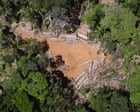
In recent developments, Brazil has seen significant shifts in its environmental policies, stirring discussions both locally and internationally. The Brazilian Congress recently passed a controversial law known as the “devastation bill,” which aims to modify existing environmental regulations. This legislative move has elicited mixed reactions, with proponents highlighting economic benefits while critics express concerns about the potential ecological impact.
This legislation, now awaiting approval or veto by the President, has stirred up passionate debates among environmentalists and political figures. The bill’s passage in Congress, with 267 votes in favor and 116 against, reflects a strong political will to transform Brazil’s regulatory framework. Yet, more than 350 organizations and social movements have voiced their opposition, fearing the bill could lead to increased deforestation and pose threats to Indigenous communities.
While Brazil grapples with these environmental policy changes, a broader conversation unfolds in other parts of the world. In Australia, there is growing concern among environmentalists regarding their representation in economic discussions. A planned economic reform summit led by Jim Chalmers has drawn criticism for its limited environmental focus. Out of the 24 invitees, only one represents environmental interests, sparking fears that the business sector might dominate the agenda, potentially sidelining crucial ecological issues.
This summit signifies the challenges environmentalists face in securing a seat at the table in critical economic discussions. The participation of Ken Henry, former Treasury Secretary and chair of the Australian Climate and Biodiversity Foundation, is a much-needed voice, yet his solitary presence highlights the need for more inclusive dialogues that consider both economic growth and environmental sustainability.
Contrastingly, in Portugal, efforts are being made to address ecological concerns directly linked to climate change. As part of an ongoing strategy to combat forest fires, the Portuguese Armed Forces have mobilized 6,000 personnel. This initiative, focusing on surveillance and detection, is a collaborative effort between the Navy, Army, and Air Force, underlining a comprehensive approach to preserving natural habitats and ensuring public safety.
These global happenings underscore the multifaceted nature of environmental conservation, illustrating diverse approaches to balancing economic development and ecological preservation. As nations navigate these complex issues, the international community watches closely, understanding that the future of environmental sustainability requires both local and global solutions.
Looking forward, these events serve as a reminder of the interconnectedness of our global ecosystem and the importance of inclusive and comprehensive policy-making. From the legislative corridors of Brazil to the strategic planning rooms in Australia and Portugal, the path to effective environmental stewardship remains a shared responsibility, calling for mindful engagement from all sectors of society.
Source: {link}
